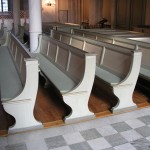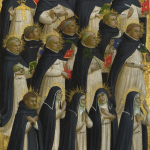This post is one in a series about Diane Duane’s Young Wizards series. I am using the books as a frame for talking about what kind of religion I might feel comfortable in. Check out all posts on this topic at the series index.
Yesterday, I wrote about one of the major reasons my pride makes me feel uncomfortable with the Christian idea of submission to God. Several commenters pointed out that Lewis’s allegory is not the only way to approach humility, so I thought I would use today to highlight a different angle on humility.
The video linked above is my favorite contemporary hymn at Mass (sorry for the poor quality, shared for audio only).
http://www.youtube.com/watch?v=P8lOfMjtxdE?fs=1Partial lyrics:
Will you let the blinded see if I but call your name?
Will you set the prisoners free and never be the same?
Will you kiss the leper clean and do such as this unseen,
and admit to what I mean in you and you in me?
The first time I encountered this song, I remember being more moved than by most of the hymns I heard at Mass. Many of the frequently featured songs had fairly interchangeable lyrics expressing of thankfulness for the Eucharist. These songs (“Taste and See” in particular) leave me cold, since the Eucharist has no significance to me. Many of these songs of Adoration are situated entirely in the human experience of communion, which didn’t illuminate anything for me.
I hadn’t encountered a pleading God in other hymns sung at Mass. This song had a clear relationship between believer and deity. Instead of dwelling on the inefficiencies of the believer, it emphasized some form of partnership, no matter the imbalance.
In this theology, the greatest power available to humans is the choice to say yes to God’s gifts, which are constantly available but must be accepted to be used. This is, as far as I understand, a major factor in the Catholic veneration of Mary, who said the biggest YES possible to God. (Thanks to Tristyn for sharing this article on Reader).
This idea did speak to me, as it had originally spoken to me in Diane Duane’s Young Wizards series, in which magic is a gift of the the Powers that Be, which may be freely rejected at any time. Of course, to do so in the books is to hasten the death of the universe, so no character would ever willing reject wizardry except in despair.
There’s a fairly obvious caveat coming: I don’t have any experience of such a summons. I can certainly take this song as a reminder that I have more power to do good than I expect and then try to live up to the gifts I have been given, but this is just a secular gloss on the hymn. Without any additional experience, this idea of God is appealing, but no more compelling than the fictional theology of Diane Duane that kicked off this series.
I suppose the most lasting impression the song left me with was how profoundly upsetting atheism must be for Christians. To a Christian, I am a person who, having heard God’s plea “Will you let me answer prayer in you and you in me?” answered and continues to answer no. To them, my entire existence must look like a willful rejection of the opportunity to do good and be good.















